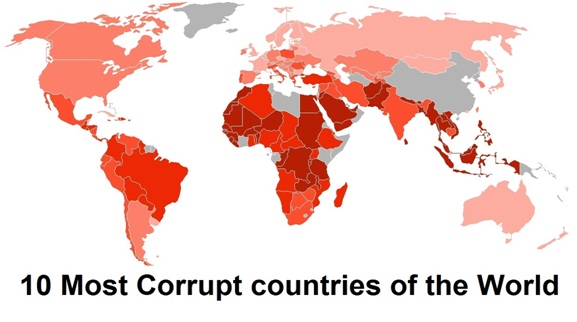Corruption is a major problem in many countries around the world. It undermines democracy, stifles economic development, and can lead to social unrest. Transparency International’s Corruption Perceptions Index ranks countries based on how corrupt their public sector is perceived to be. Based on this index, the following are the 10 most corrupt countries in the world.
Somalia
Transparency International’s Corruption Perceptions Index consistently ranks Somalia as the most corrupt country in the world. The country has been embroiled in conflict for decades, and the lack of a functioning central government has contributed to widespread corruption. Bribery, embezzlement, and fraud are common in Somalia, particularly in the public sector.
South Sudan
South Sudan is a young country that gained independence from Sudan in 2011. However, it has struggled with corruption since its inception. The country’s leaders have been accused of embezzling public funds and using their positions of power for personal gain. The ongoing civil war in South Sudan has exacerbated the problem, as both sides have been accused of looting and exploiting natural resources.
North Korea
North Korea is a highly authoritarian and isolated country, and information about its internal workings is difficult to come by. However, it is widely believed that corruption is pervasive in the country, particularly at the highest levels of government. The ruling regime has been accused of using its power to enrich itself and maintain control over the population.
Syria
Syria has been engulfed in civil war for over a decade, and the conflict has led to widespread corruption and abuse of power. The government, opposition forces, and various armed groups have all been accused of corruption and predatory behavior. The ongoing conflict has also made it difficult for anti-corruption efforts to take hold.
Yemen
Yemen has struggled with corruption for years, and the ongoing civil war has exacerbated the problem. Officials at all levels of government have been accused of embezzlement, nepotism, and abuse of power. The lack of a functioning central government has made it difficult to address corruption in the country.
Venezuela
Venezuela was once one of the wealthiest countries in South America, but it has been hit hard by economic collapse and political instability in recent years. Corruption has been a major factor in the country’s decline, with officials at all levels of government accused of embezzlement and abuse of power. The government’s efforts to crack down on corruption have been criticized as superficial and politically motivated.
Eritrea
Eritrea is a small country on the Horn of Africa that has been ruled by the same authoritarian regime since it gained independence from Ethiopia in 1993. The government has been accused of widespread corruption, including embezzlement of public funds and abuse of power. Eritrea is also one of the most closed and repressive countries in the world, which makes it difficult to get accurate information about the extent of corruption there.
Sudan
Sudan is a large country in North Africa that has struggled with corruption for many years. Officials at all levels of government have been accused of embezzlement, bribery, and abuse of power. The ongoing conflict in Sudan’s Darfur region has also contributed to corruption, as various armed groups have been accused of looting and exploiting natural resources.
Zimbabwe
Zimbabwe is a country in southern Africa that has struggled with corruption for many years. Officials at all levels of government have been accused of embezzlement, bribery, and abuse of power. The country’s economic decline and political instability have exacerbated the problem of corruption.
Combating corruption is a complex and challenging task, but it is essential for the health and prosperity of societies worldwide. The countries on this list face particular challenges in addressing corruption, but there are also many examples of countries that have made significant progress in recent years. Shining a light on corruption and holding those responsible accountable makes it possible to create a more transparent and fair society for all.

